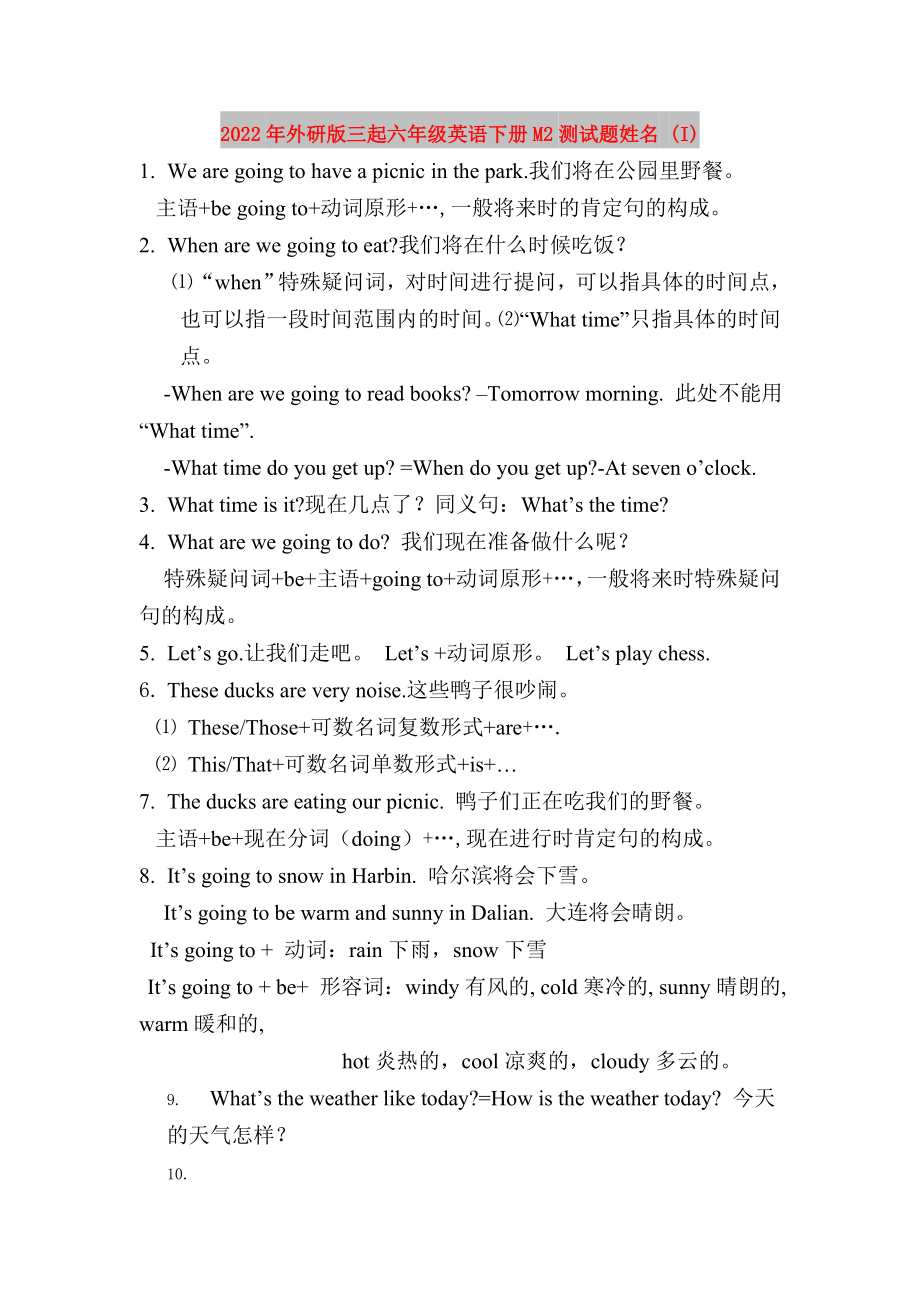《2022年外研版三起六年級(jí)英語(yǔ)下冊(cè)M2測(cè)試題姓名 (I)》由會(huì)員分享����,可在線閱讀�����,更多相關(guān)《2022年外研版三起六年級(jí)英語(yǔ)下冊(cè)M2測(cè)試題姓名 (I)(2頁(yè)珍藏版)》請(qǐng)?jiān)谘b配圖網(wǎng)上搜索�。
1�、2022年外研版三起六年級(jí)英語(yǔ)下冊(cè)M2測(cè)試題姓名 (I)
1. We are going to have a picnic in the park.我們將在公園里野餐。
主語(yǔ)+be going to+動(dòng)詞原形+…,一般將來(lái)時(shí)的肯定句的構(gòu)成�。
2. When are we going to eat?我們將在什么時(shí)候吃飯��?
⑴“when”特殊疑問(wèn)詞�,對(duì)時(shí)間進(jìn)行提問(wèn)���,可以指具體的時(shí)間點(diǎn)��,也可以指一段時(shí)間范圍內(nèi)的時(shí)間���。⑵“What time”只指具體的時(shí)間點(diǎn)��。
-When are we going to read books? –Tomorrow morning. 此處不能用“What ti
2���、me”.
-What time do you get up? =When do you get up?-At seven o’clock.
3. What time is it?現(xiàn)在幾點(diǎn)了�����?同義句:What’s the time?
4. What are we going to do? 我們現(xiàn)在準(zhǔn)備做什么呢�?
特殊疑問(wèn)詞+be+主語(yǔ)+going to+動(dòng)詞原形+…�,一般將來(lái)時(shí)特殊疑問(wèn)句的構(gòu)成。
5. Let’s go.讓我們走吧�。 Let’s +動(dòng)詞原形。 Let’s play chess.
6. These ducks are very noise.這些鴨子很吵鬧�����。
⑴ T
3�、hese/Those+可數(shù)名詞復(fù)數(shù)形式+are+….
⑵ This/That+可數(shù)名詞單數(shù)形式+is+…
7. The ducks are eating our picnic. 鴨子們正在吃我們的野餐��。
主語(yǔ)+be+現(xiàn)在分詞(doing)+…,現(xiàn)在進(jìn)行時(shí)肯定句的構(gòu)成��。
8. It’s going to snow in Harbin. 哈爾濱將會(huì)下雪�。
It’s going to be warm and sunny in Dalian. 大連將會(huì)晴朗。
It’s going to + 動(dòng)詞:rain下雨�����,snow下雪
It’s going to + be+ 形容詞:windy
4、有風(fēng)的, cold寒冷的, sunny晴朗的, warm暖和的,
hot炎熱的�,cool涼爽的,cloudy多云的����。
9. What’s the weather like today?=How is the weather today? 今天的天氣怎樣���?
10.
11. 附送:
2022年外研版三起六年級(jí)英語(yǔ)下冊(cè)M2測(cè)試題姓名
12. We are going to have a picnic in the park.我們將在公園里野餐。
主語(yǔ)+be going to+動(dòng)詞原形+…,一般將來(lái)時(shí)的肯定句的構(gòu)成��。
13. When are we going to eat?我
5��、們將在什么時(shí)候吃飯�?
⑴“when”特殊疑問(wèn)詞��,對(duì)時(shí)間進(jìn)行提問(wèn)����,可以指具體的時(shí)間點(diǎn),也可以指一段時(shí)間范圍內(nèi)的時(shí)間�����。⑵“What time”只指具體的時(shí)間點(diǎn)。
-When are we going to read books? –Tomorrow morning. 此處不能用“What time”.
-What time do you get up? =When do you get up?-At seven o’clock.
14. What time is it?現(xiàn)在幾點(diǎn)了���?同義句:What’s the time?
15. What are we going to do? 我們現(xiàn)
6��、在準(zhǔn)備做什么呢�����?
特殊疑問(wèn)詞+be+主語(yǔ)+going to+動(dòng)詞原形+…,一般將來(lái)時(shí)特殊疑問(wèn)句的構(gòu)成�����。
16. Let’s go.讓我們走吧���。 Let’s +動(dòng)詞原形�。 Let’s play chess.
17. These ducks are very noise.這些鴨子很吵鬧���。
⑴ These/Those+可數(shù)名詞復(fù)數(shù)形式+are+….
⑵ This/That+可數(shù)名詞單數(shù)形式+is+…
18. The ducks are eating our picnic. 鴨子們正在吃我們的野餐����。
主語(yǔ)+be+現(xiàn)在分詞(doing)+…,現(xiàn)在進(jìn)行時(shí)肯定句的構(gòu)成��。
19. It’s going to snow in Harbin. 哈爾濱將會(huì)下雪。
It’s going to be warm and sunny in Dalian. 大連將會(huì)晴朗��。
It’s going to + 動(dòng)詞:rain下雨�,snow下雪
It’s going to + be+ 形容詞:windy有風(fēng)的, cold寒冷的, sunny晴朗的, warm暖和的,
hot炎熱的,cool涼爽的�����,cloudy多云的����。
20. What’s the weather like today?=How is the weather today? 今天的天氣怎樣?
 2022年外研版三起六年級(jí)英語(yǔ)下冊(cè)M2測(cè)試題姓名 (I)
2022年外研版三起六年級(jí)英語(yǔ)下冊(cè)M2測(cè)試題姓名 (I)

